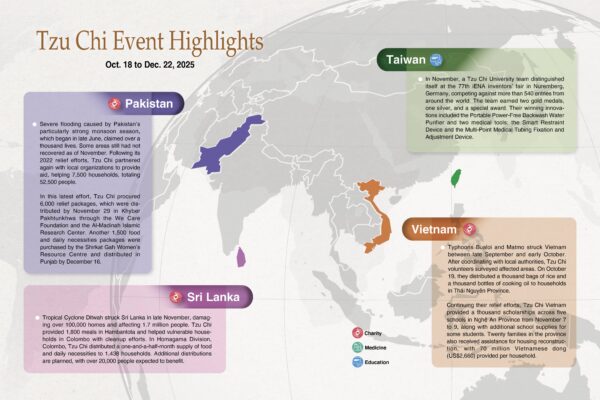By Monica Chang, Susan Chen, Chen Hui-ru, Anastasiia, and Zhu Xiu-lian
Translated by Wu Hsiao-ting
Photos courtesy of Monica Chang
As the war in Ukraine drags on, Tzu Chi continues aid for displaced Ukrainians in Poland, providing language and vocational training courses as well as other services to facilitate their integration into a foreign land.
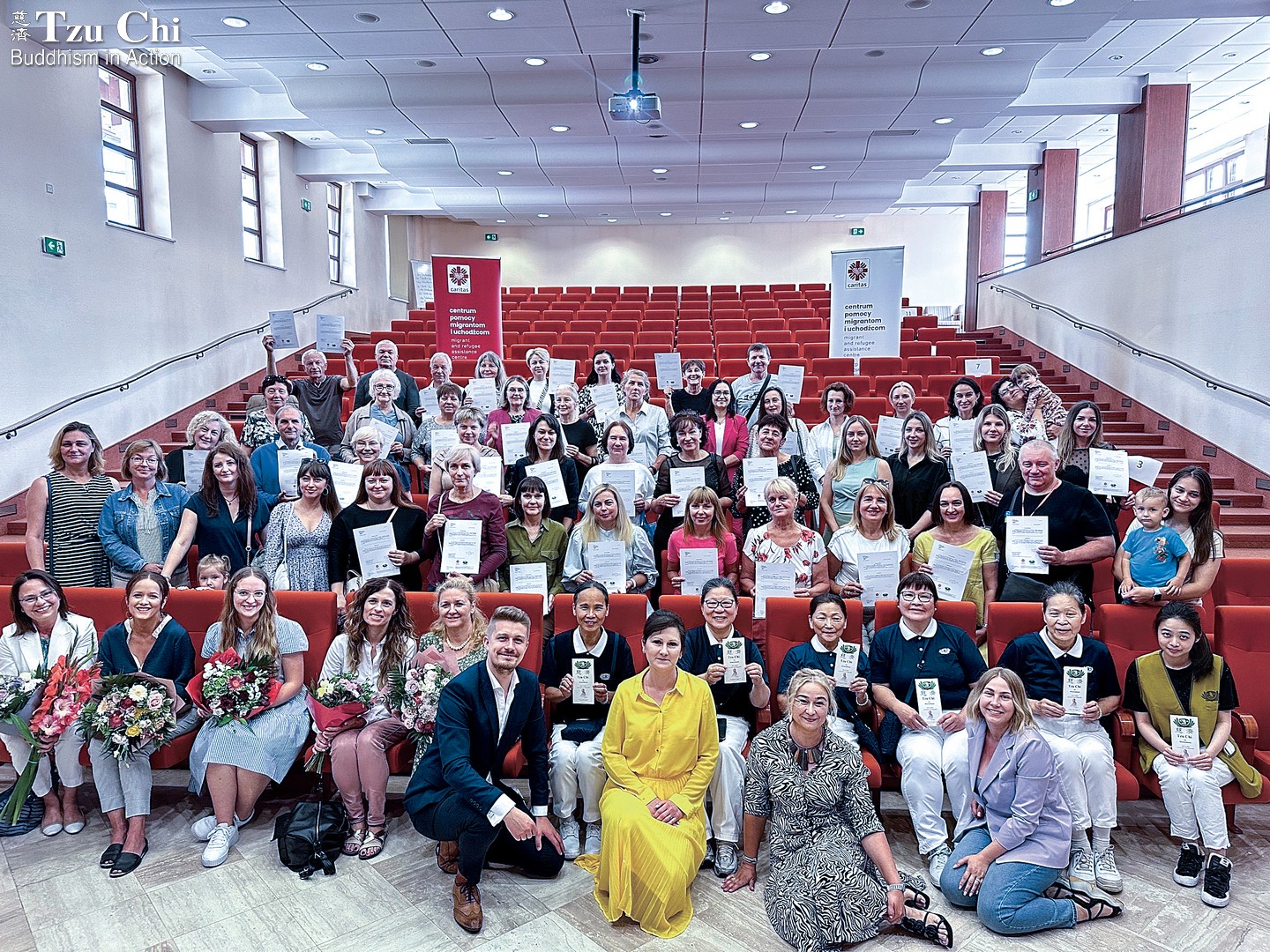
On July 29, 79 Ukrainians received EU-recognized certificates at a Caritas hall in Lublin after successfully completing their Polish language courses, courtesy of the efforts of Tzu Chi and Caritas.
Sergii
The Russia-Ukraine war has persisted for 20 months. While younger Ukrainian men remain in their homeland to defend their nation, many elderly people, women, and children have fled to foreign lands, facing challenges in sustaining themselves and uncertain family reunions.
Hanna Prasolova, an English teacher from Ukraine, obtained a language certification during her time as a refugee in Poland. She said that as a foreign language teacher, she understood the importance of knowing the local language in a foreign country. “It’s the first step towards an easier life in a foreign land,” she remarked. “There is, however, a significant distinction between being able to speak the language and possessing a certificate that proves your proficiency, especially in terms of job applications. Attaching a European Union-recognized certificate to your resume is the most direct and compelling evidence for your language proficiency.”
As part of their humanitarian efforts for Ukrainian refugees in Poland, the Tzu Chi Foundation offers language courses to aid them with their integration into local society. For instance, in Lublin, eastern Poland, Tzu Chi, in collaboration with Caritas Lublin, has supported 79 individuals so far this year in completing their language courses. They received their graduation certificates at the end of July.
The value of this graduation certificate should not be underestimated, as noted by Tzu Chi volunteer Chen Shu-nu (陳淑女), who lives in Germany: “This certificate aligns with the guidelines of the Common European Framework of Reference for Languages, put together by the Council of Europe. These guidelines encompass proficiency levels from A1, A2, B1, B2 to C1 and C2, each with scores ranging from one to five.” The levels mentioned by Chen describe one’s language ability, with Level A1 representing beginning levels of proficiency, up to C2 for those who have mastered a language.
Chen continued, “Holding such a certificate, participants of our language courses allow people across Europe to assess their proficiency in listening, speaking, reading, and writing.” The certificate not only aids in job hunting but also enables individuals under the age of 26 with a B2 language proficiency, regardless of their nationality, to study for free in Poland from primary school to university.
While Ukrainian and Polish share some similarities, mastering the grammar can be challenging. The language courses supported by Tzu Chi mentioned earlier took place at the Catholic University of Lublin. Aleksandra Czaplewska, one of the teachers, said that completing the course was quite demanding. Students often needed to balance work, education, and family responsibilities.
Instructors not only taught Polish but also shared all kinds of practical information and introduced students to potential employment opportunities. Even though older students may not work anymore, understanding Polish made shopping and engaging in conversations easier, reducing their sense of isolation. Becoming familiar with the local language undoubtedly brought a sense of relief.
Magdalena Gardzisz Gisza, another teacher, expressed pride in her B1-level students. “They made such rapid improvement,” she said. “Some have even secured jobs or gained admission to universities, demonstrating the effectiveness of Tzu Chi in assisting individuals in achieving professional and academic success.”
Tzu Chi volunteers lead elderly Ukrainian refugees in signing the lyrics of the Tzu Chi song “One Family” during a routine food distribution in Lublin, creating an atmosphere of care and support.
Sergii
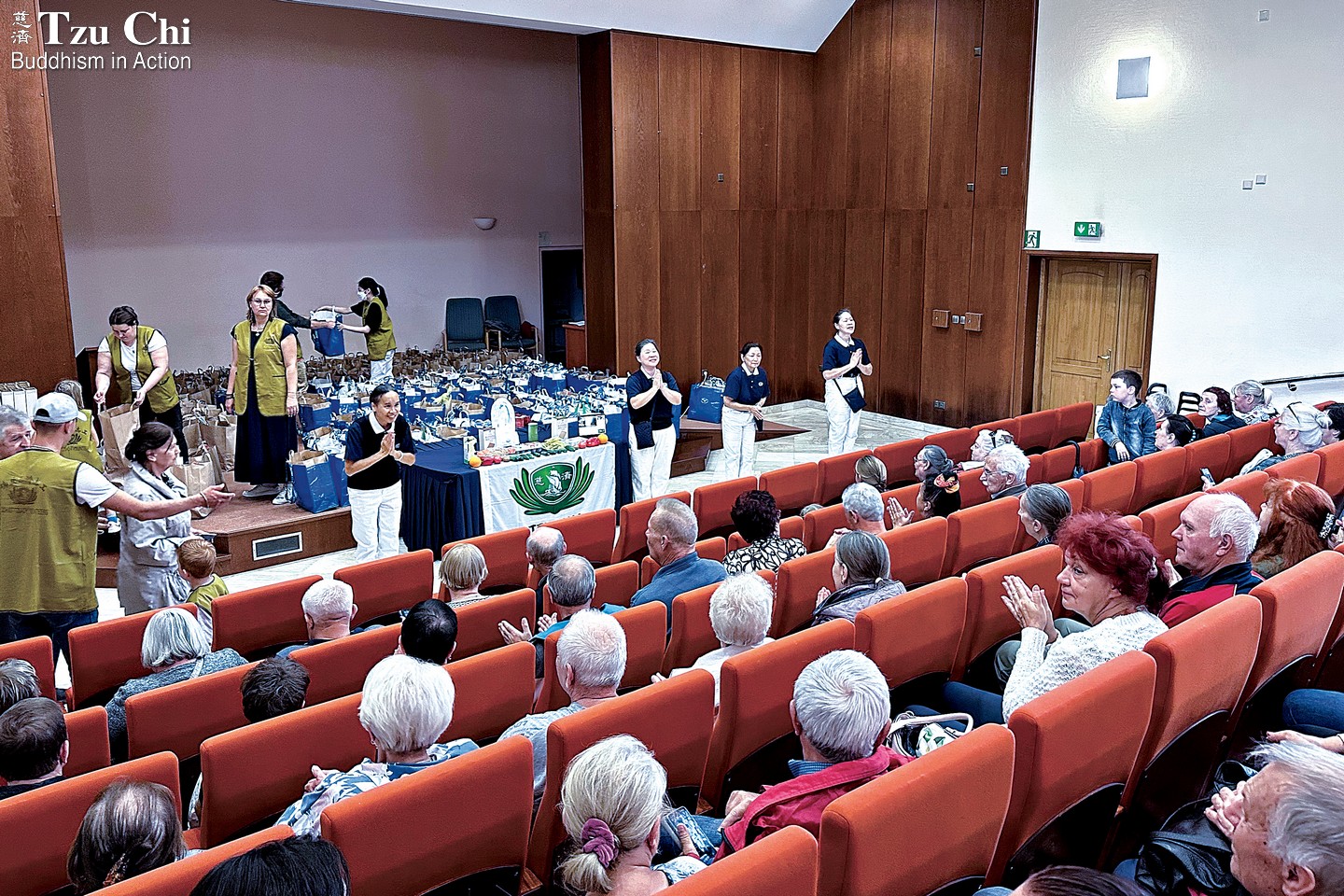
To leave or stay
Poland, sharing a border with Ukraine, accommodated the largest number of refugees during the early stages of the war. Government entities and domestic and international charitable organizations were initially focused on providing for refugees’ basic needs. Take, for example, Opole, a major city in the southwestern province of the same name. An affiliated agency of the social services department in the city provided round-the-clock assistance, including organizing the care of Ukrainian refugees by residents of Opole originally from Ukraine. The department subsequently assisted with employment opportunities.
Given the need for mothers to work and the absence of caregivers for their children during summer vacation, the social services department introduced day-care services from 8 a.m. to 3 p.m. each weekday. This arrangement allows children from both Poland and Ukraine to engage together in drawing, playing, and reading activities, promoting integration.
The Red Cross branch in Opole Province distributed essential supplies to refugees almost daily after the war broke out to help them get through the emergency period. Now, due to a decline in public donations, distributions have decreased to 12 times per month, specifically targeting the elderly, mothers with three or more children, and individuals with disabilities.
Opole’s Tzu Chi volunteers, Chen Hui-ru (陳惠如) and Radosław Atlas, a couple, organized 18 distributions for Ukrainian refugees at a local stadium in June and July last year, providing gift or cash cards and blankets. In December last year, they initiated a collaborative program with the University of Opole, offering Polish language classes and vocational training to refugees to improve their employment opportunities.
The language classes, scheduled from mid-December 2022 to March 31, 2023, were initially planned for 300 people but received an overwhelming response from over 400 applicants. Eventually, 350 students were enrolled, with eight teachers from Opole University providing the instruction. An intensive class was arranged based on the urgent needs of some refugees. Notably, the classes were not conducted on the university campus but in dispersed teaching locations, primarily in coordination with high schools, primary schools, or cultural centers located in areas where the refugees resided. The intensive class was held in a hotel accommodating a larger concentration of refugees.
Despite the high initial enrollment, not every student managed to complete the courses. Refugees often found themselves torn between staying in Poland or returning home. For those planning to settle long-term, learning Polish was imperative, yet the possibility of returning home in the near future added to their dilemma. The program’s volunteers fully comprehended this predicament and provided their best assistance to the refugees, regardless of their eventual decisions.
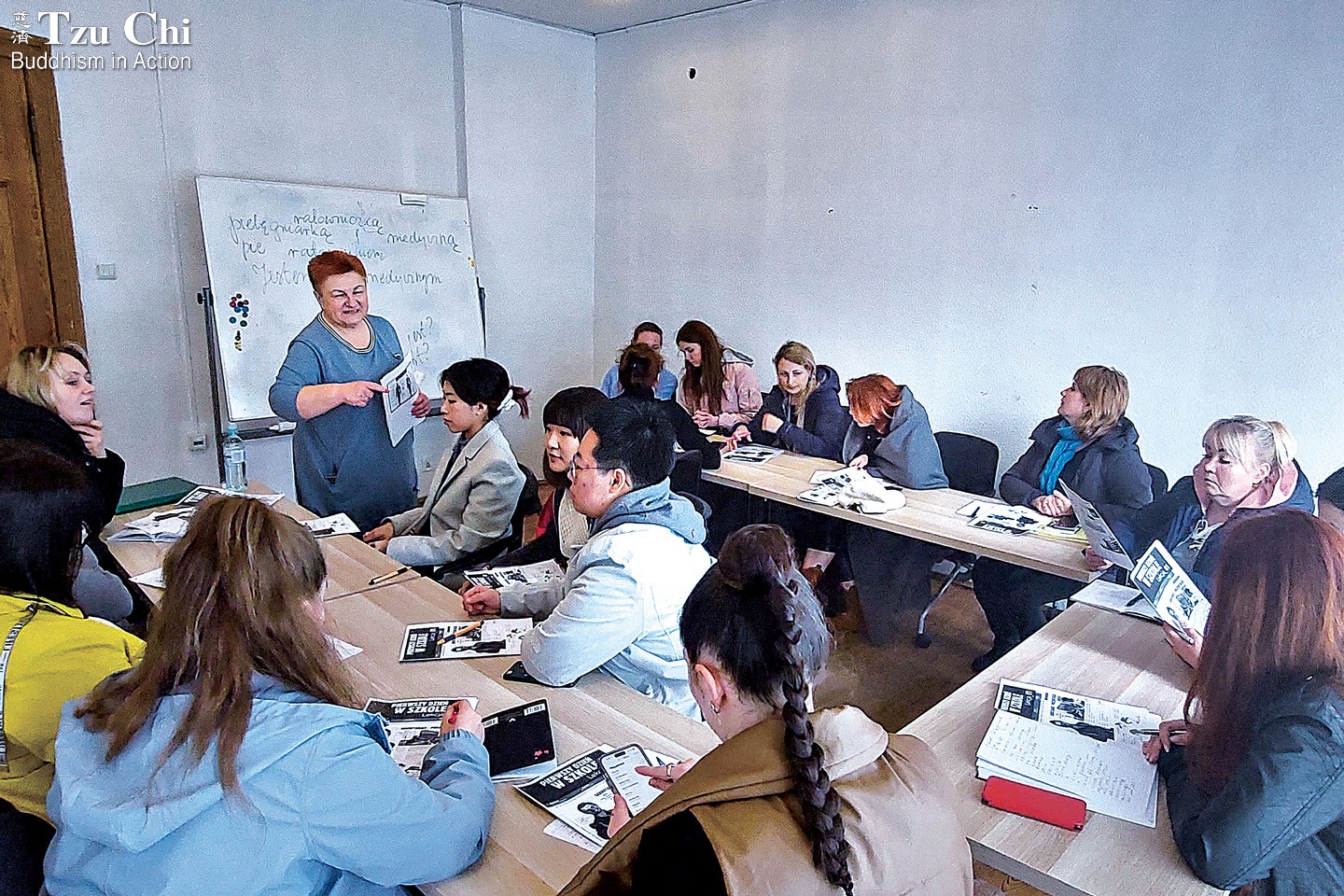
Tzu Chi volunteers in Poznań launched a medical Polish language course, which, in less than 12 hours of its announcement, drew more than 50 Ukrainian doctors, nurses, and other healthcare professionals to enroll for participation.
The dental department of the Poznań University of Medical Sciences, in collaboration with Tzu Chi, provides free dental treatments every month for financially challenged Ukrainian families in Poland.
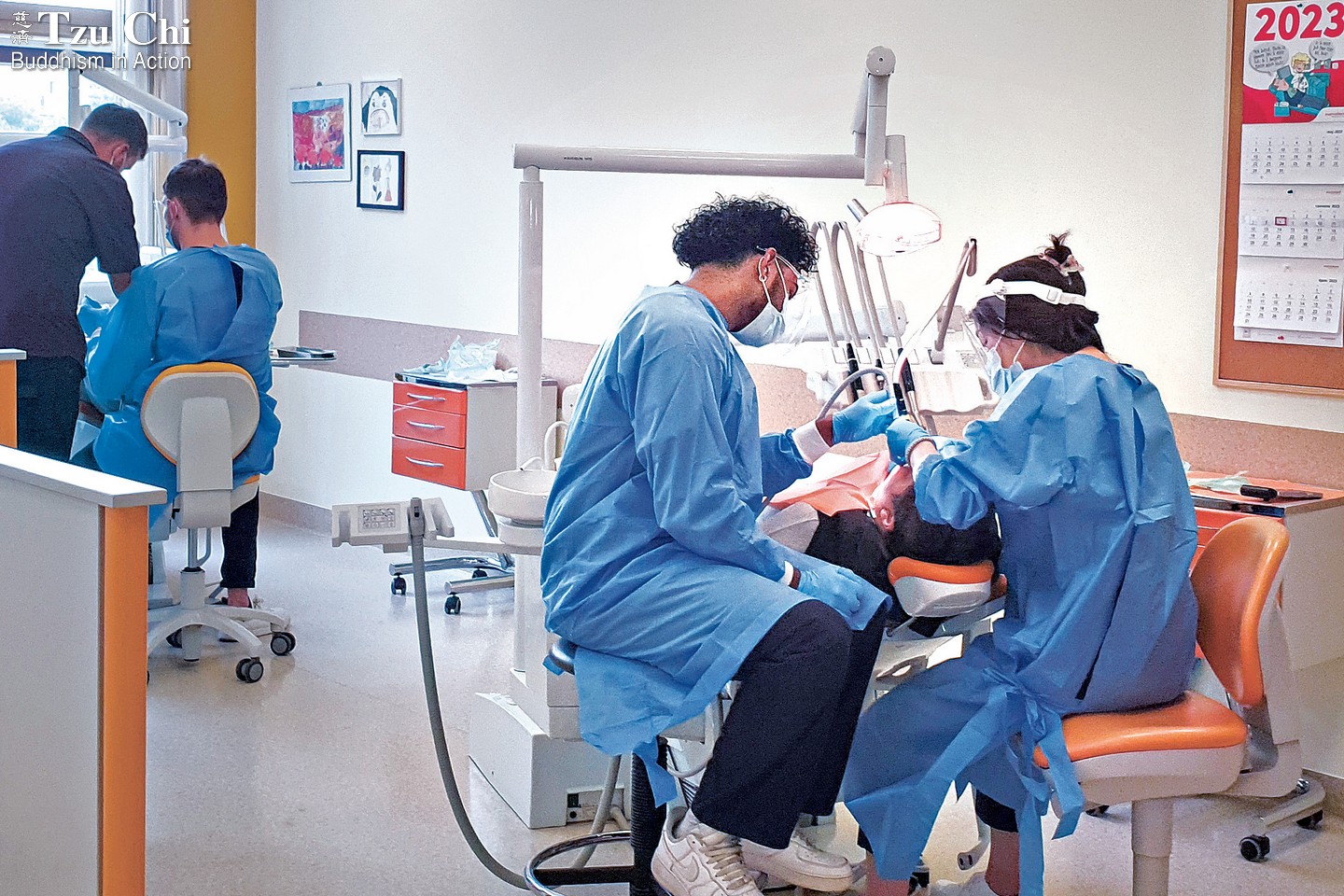
Practicing medicine in Poland
At the end of 2022, the Polish government made an important announcement, allowing Ukrainian doctors with existing qualifications in their home country to practice medicine in Poland for a maximum of five years. This policy not only helps alleviate the scarcity of medical professionals in Poland but also presents Ukrainian doctors with the opportunity to establish themselves locally, leading to a more stable livelihood.
As soon as this policy was announced, Łukasz Baranowski and his wife, Monica Chang (張淑兒), Tzu Chi volunteers in Poznań, west-central Poland, recognized the need for Ukrainian medical practitioners to learn medical Polish. This policy required Ukrainian medical personnel to possess a certain level of proficiency in Polish, especially in medical contexts, to effectively communicate with patients.
In response, the couple sought collaboration with Adam Mickiewicz University in Poznań, ranked the third best Polish university, to launch a medical Polish language course for Ukrainian doctors.
This language course wasn’t the first offered by Tzu Chi in Poznań. Starting in August 2022, the foundation had been providing free Polish language classes to Ukrainian refugees in the city. But the newly introduced course focused on medical Polish language, required students to maintain an attendance rate of over 80 percent, gain an in-depth understanding of Poland’s medical system and laws, and pass a rigorous examination to qualify for a certificate jointly issued by Adam Mickiewicz University and Tzu Chi.
A total of 50 students participated in the course, graduating in August this year. Twenty-three of them have successfully passed the medical Polish language tests conducted either by the government or hospitals. This accomplishment enabled these doctors to utilize their expertise in Poland, earning a lawful income and aiding their families in achieving financial independence in the country.
One of the beneficiaries, Alona Tokarieva, had 18 years of experience as a chest physician in Kharkiv, Ukraine. She expressed her gratitude to Tzu Chi for providing the course, enabling her to work as a physician in a clinic in Poland. Similarly, Natalya Kozoriz from Chernivtsi, a city in western Ukraine, had served in pediatrics for 35 years. After arriving in Poznań, she assumed the role of an assistant nurse in a children’s hospital. Upon completing the medical Polish language course, she submitted an application for a nursing license to the health department, aspiring to continue her professional journey formally in Poland.
Yuliya Krapyvna holds a master’s degree in pharmacy and had a decade of experience as a pharmacy manager in Kharkiv. She secured a position as an assistant to a pharmacist following her completion of the medical Polish language course. Notably, two of the beneficiary doctors have also become volunteers, dedicating three days each week to providing free medical services to their Ukrainian compatriots. In September alone, they conducted medical consultations for 42 patients at the Tzu Chi office in Poznań.
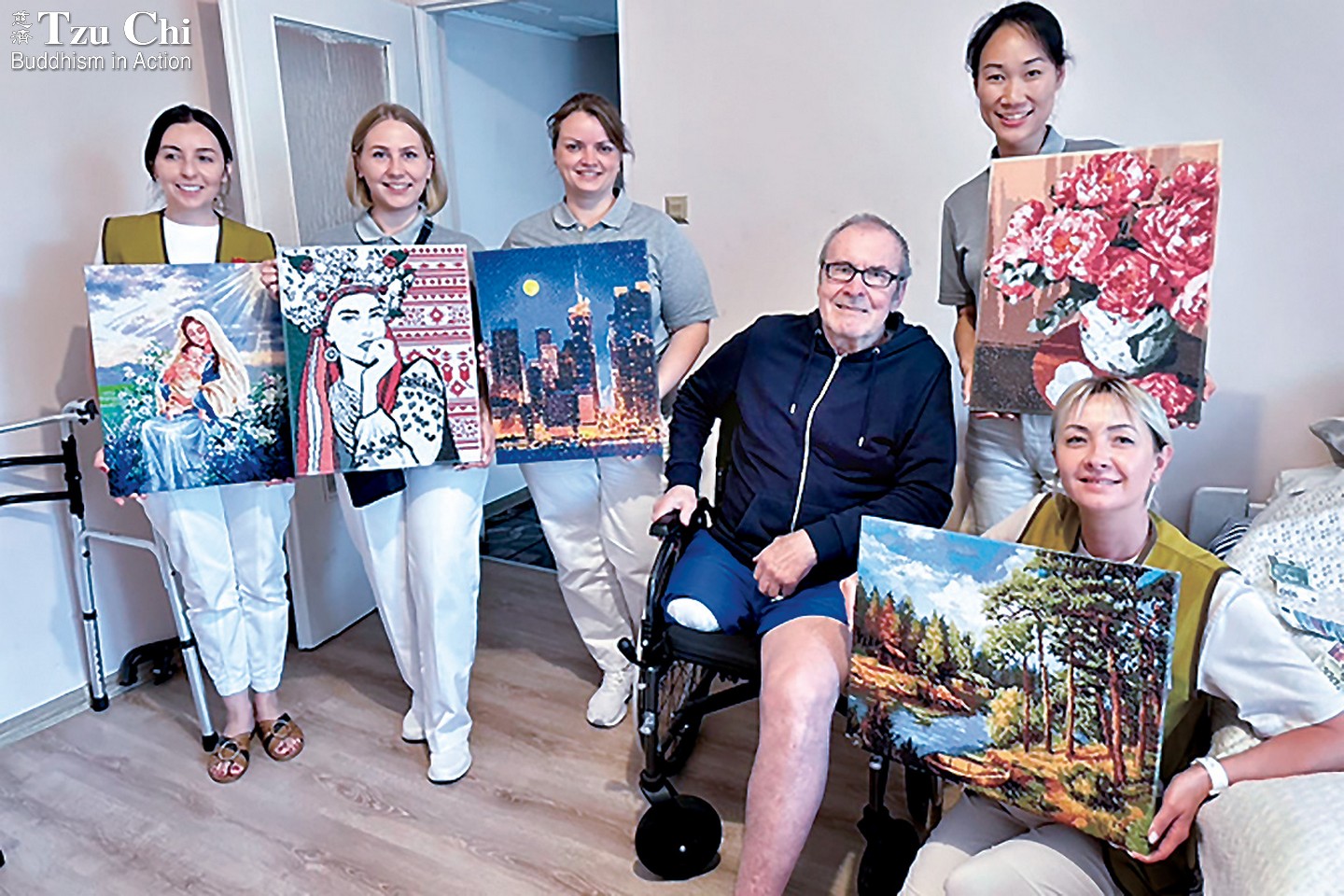
In August, Tzu Chi volunteers visited Vladimir Grankin (third from right), a Ukrainian senior who had been saving up for the cost of prosthetic installation by selling his artworks. The volunteers supported him by purchasing his paintings.
Free dental services
The Tzu Chi Poznań team offers a diverse range of aid to refugees, serving over 1,300 people every month (with repeated services counted as separate recipients). Their support includes adult vocational training courses, such as medical Polish, hairdressing, makeup, and entrepreneurship. They also provide an array of classes for children and adolescents, spanning computer programming, English, gymnastics, drawing, and international chess.
In Poland, the scope of available free dental services is severely limited. Even employed families with mandatory health insurance are entitled to only basic check-up services, with wait times for appointments ranging from two to six months. If one opts for treatment at a private clinic, a single consultation alone may cost over 35 U.S. dollars. Procedures like a tooth extraction or a root canal would result in additional expenses, posing an even greater financial challenge for jobless Ukrainian families.
Dental problems cannot be ignored. Łukasz Baranowski and Monica Chang received support from Professor Karolina Anna Gerreth at the affiliated hospital of the Poznań University of Medical Sciences and started providing free dental services for disadvantaged Ukrainian families every month.
Thirty-eight-year-old Kateryna Velychko fled with her two underage children, Roman and Viktoriia, from Zaporizhzhia, a southeastern Ukrainian city housing the largest nuclear power plant in Europe. The three of them reached Poznań on March 9 last year. Kateryna’s 70-year-old father, Volodymyr Honcharenko, also underwent a challenging journey before reuniting with them.
Kateryna, a beneficiary of cash cards distributed by Tzu Chi for Ukrainian refugees, had been a full-time homemaker in Ukraine and had struggled to find employment after arriving in Poland. Not having a job, combined with a monthly rent of 2,300 Polish zlotys (US$545), forced her to endure frequent toothaches without seeking treatment. It was only with the help of Tzu Chi that she finally received the much-needed dental treatment in June this year, finding relief from her pain.
Anna Kholiavka arrived in Poland in March this year with her three-month-old daughter and underage son. Financial constraints hindered her from prioritizing her own health, as almost all money available to her was dedicated to childcare and rent. “I have no relatives here,” she said. “My husband is serving in the frontline armed forces. I pray for his safety every day, longing for the day our family can reunite.” She faced dental issues after giving birth, and her son, Hlib, suffered from tooth decay too. Both received free treatment from Professor Gerreth.
Hlib also joined the international chess course offered by Tzu Chi. His participation in the weekly classes continuously enhanced his chess skills, earning him admiration from his peers. Volunteers extended their best wishes for his success in future competitions.
The Tzu Chi team in Poznań provides vocational training and other courses for Ukrainian refugees. Hlib Kholiavka (pictured on the left) attends the weekly chess class and is an admired player among his peers.
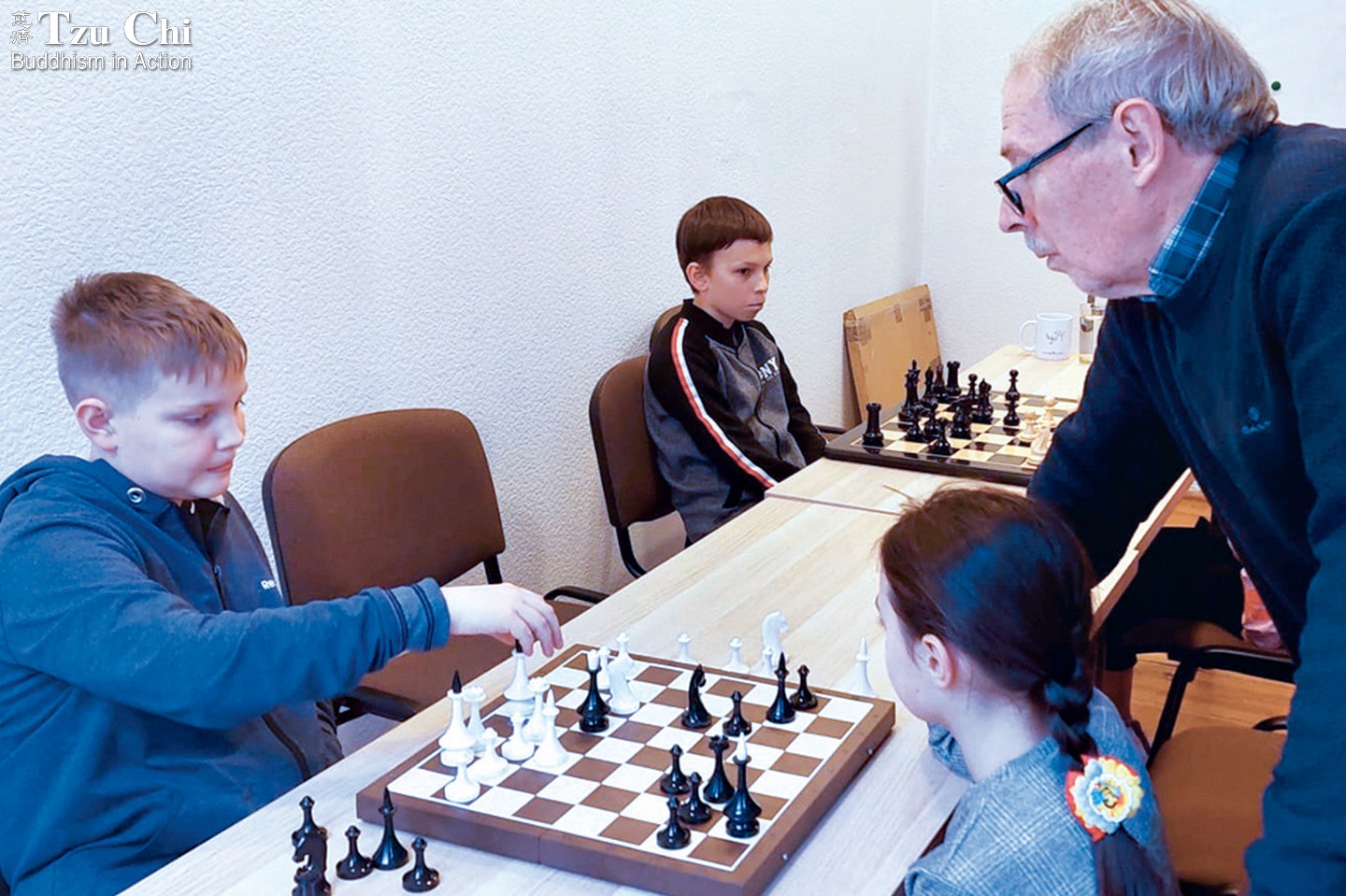
Don’t cry for me
Lublin, located in eastern Poland near the Ukrainian border, offers a relatively low cost of living. It serves as a temporary stop for many refugees from Ukraine before they continue on their journey. Those who choose to stay are often individuals with constrained financial means, unable to afford the higher costs of living in other areas. Another reason they choose the city is its proximity to their homeland. This closeness implies that, in times of dire need, they can more easily manage the journey back to Ukraine.
For more than a year now, the Lublin Tzu Chi team, consisting of Ukrainians, Polish locals, and Taiwanese students, has placed special emphasis on tending to the needs of elderly refugees and those facing physical and mental challenges in the city. The Polish government’s monthly allowance, equivalent to 95 U.S. dollars for each Ukrainian senior, is insufficient to help the elderly cope with the mounting living costs. Recognizing this, Tzu Chi has been distributing various food items, such as vegetables, grains, and legumes, to those aged 65 and above since September last year, ensuring they have access to nutritious food for maintaining their health. These distributions, conducted every ten to 14 days, benefit 200 to 250 people each time.
Volunteers thoughtfully prepare an array of food items for each distribution. For instance, during a distribution event in late August, they offered eggs, bread, cooking oil, buckwheat, tomatoes, cucumbers, zucchinis, as well as bananas and pears, allowing the elderly to effortlessly prepare salads and main dishes. They also distributed root vegetables, perfect for soups.
Anastasiia, who originally came to Poland for her studies and now manages a nail salon in Lublin, started volunteering with Caritas after witnessing the plight of her compatriots. She also took on the role of a contact person for Tzu Chi. “The consistent support provided by Tzu Chi for the elderly through these food distributions truly warms one’s heart,” she said. When each distribution concluded, the elderly would leave, some struggling with their heavy bags. Their solitary figures never failed to stir the volunteers’ emotions. Unexpectedly, it was the elderly who offered solace to the volunteers, saying, “Don’t feel sorry for us; we’re grateful to have food for the next ten days. We can rest easy knowing we won’t go hungry and can sleep peacefully at night.” Thankful for more than a year of Tzu Chi’s companionship, they bid their farewells with a heartfelt “Thank you very much. We’ll see you in ten days.”

